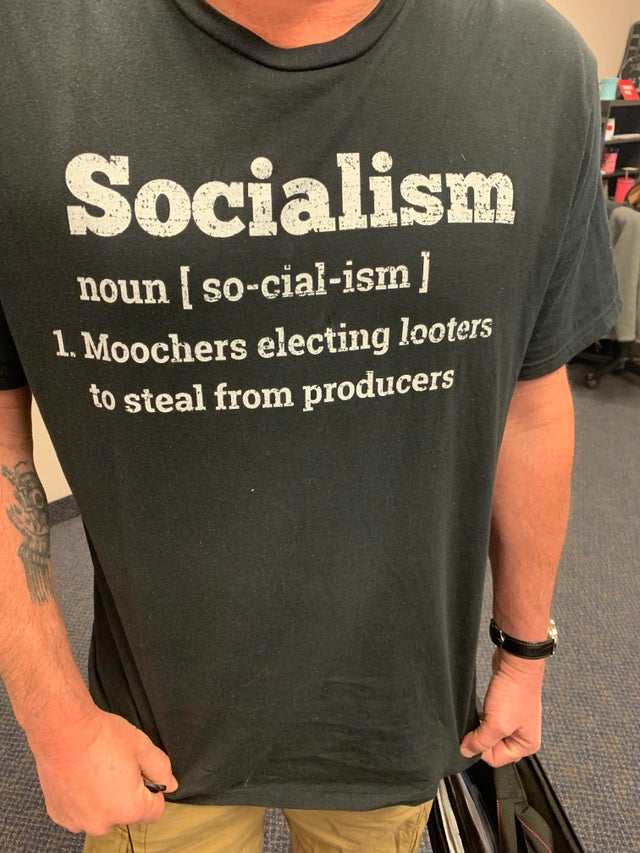Inspired by Skip’s recent Notable Quote post from Café Hayek, I got to thinking about the basic differences between a free market economic system and socialism.
It appears to be a daunting comparison, but he hit it on the head with his Harbor Freight analogy: capitalism encourages cooperation between strangers in order to produce goods that the public wants to purchase. A centrally planned economy does not have any of these incentives. Hayek himself discussed this problem in his article The Use of Knowledge in Society. Specifically:
“The peculiar character of the problem of a rational economic order is determined precisely by the fact that the knowledge of the circumstances of which we must make use never exists in concentrated or integrated form but solely as the dispersed bits of incomplete and frequently contradictory knowledge which all the separate individuals possess.”
Stated another way, a dictator or a bureaucratic state could have more knowledge than anyone in society, but a dictator or a bureaucratic state could not possibly have more knowledge than everyone in society. As such, socialism creates inefficiencies, whereas the dispersed knowledge in capitalism creates unintentionally beneficial incentives: the folks who best serve their fellow man are rewarded.
We want to thank Richard Malaby for this Op-Ed. If you have an Op-Ed or LTE you want
us to consider, please submit it to Skip@GraniteGrok.com or Steve@GraniteGrok.com.
A little thought experiment to illustrate the point: who is the wealthiest individual you know, personally? Would you consider that person to be a one-percenter? That is, one of those outrageously rich folks we always hear our compassionate politicians railing against?
If you stop and think about it, you, dear reader, are one of the wealthiest people in the world. No joke! We Americans live in the wealthiest society in the most prosperous period of human history.
By the blessing of living in the United States, we are part of the wealthiest 1% of people to have ever walked the earth – a fraction of that 1%, in fact! Education which was once reserved for the children of royalty is now publicly accessible! Medical care is available to everyone regardless of our ability to pay!
According to the Census Bureau, there are about thirty million Americans in poverty, a term which is typically understood to mean severe material deprivation such as food or shelter. By the standards set by our government, the typical poor American family has a car, air conditioning, two color televisions, cable, and multiple cell phones.
This is not to suggest that financial hardship does not exist in America, but by and large, almost all Americans can enjoy conveniences that either did not exist in the past or are considered luxuries throughout the rest of the world. Simply acquiring food is still a problem for much of the planet, yet over 70% of American adults are overweight, and almost 40% are obese, a hitherto unknown problem.
Our challenges are that of abundance.
Still think I’m nuts? Who would you rather be: John Rockefeller a century or so ago at the height of Standard Oil making tens of millions of dollars a year when the average income was under $700, or you, right now, with your smartphone, WiFi, refrigerator, microwave, car, flush toilet, and TV?
Much ink is spilled decrying “income inequality,” but my response is: who cares? There will always be some extremely wealthy people. What matters is poverty, the standard of living for the poorest among us. That standard of living in America is unquestionably much better than everywhere else in the world, and it’s because of our free-market economy and the profit motive.
Our businesses have the incentive to produce the goods Americans want to buy, of the highest quality, at the lowest cost. By doing so, society benefits. Socialism promises its believers their basic necessities but fails to deliver; it’s why North Korea is filled with Potemkin villages. South American countries do not have enough food to feed their people. And over half a billion Africans do not have electricity. Capitalism promises nothing, but to folks who are willing to work, to serve their fellow man, it can provide more than they could ever imagine.
Richard Malaby is a commercial glass project manager. He lives in Derry, New Hampshire, with his wife and daughter.
Note: Shared Content may not necessarily reflect the views of GraniteGrok.com.
